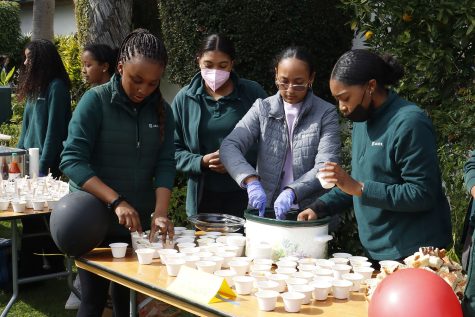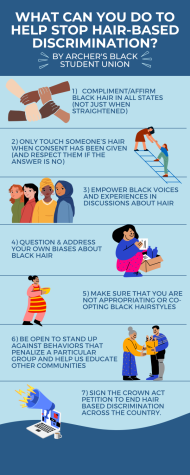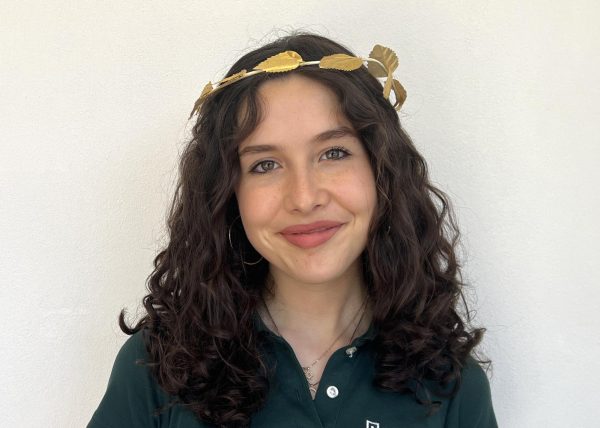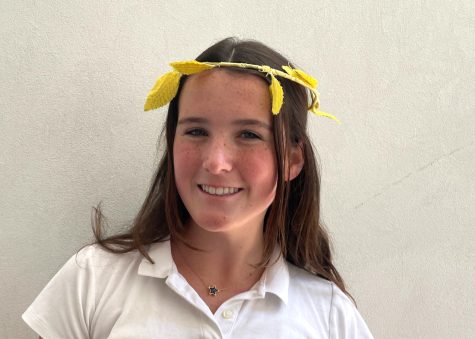From soul food to rhythm and blues: BSU hosts cultural festivities for Black History Month
March 15, 2023
“Black Resistance” was the national theme of this year’s Black History Month, which recognized how Black Americans have fought against a history of oppression and advocated for racial equality in the United States. From the Montgomery bus boycotts protesting segregated buses to the nationwide protests against police brutality following the murder of George Floyd, this month celebrated decades of resistance against racial discrimination.
To celebrate their heritage month, Archer’s Black Student Union planned three schoolwide events. Co-president Zoe Griffin (’23) said the role not only required frequent event planning, but it also came with a weighted responsibility to teach the community about Black culture.
“The theme for Black History Month this year is definitely more overarching and all-encompassing,” Griffin said. “In past years, we focused in depth on a certain aspect of Black history that wasn’t necessarily being covered in the classroom. Last year was the Black Panthers. This year, we made it more about Black culture rather than Black history— definitely different than what we’ve done before.”
Students lined up in the courtyard Feb. 2 for a “Taste of Soul” food festival, serving home-cooked cultural dishes BSU members brought from home. Students sampled desserts such as beignets, peach cobbler and sweet potato pie and main dishes such as collard greens, Jamaican chicken curry and Guyanese curry with roti. BSU set up poster boards so students could learn about the significance of the dishes while tasting them.
“It was a lot of organizing, but for the people who brought food from home – to see their family’s food being enjoyed by the larger community was important for the validation of Black culture on campus,” Griffin said. “We also tried to add a learning aspect to it with poster boards telling you where the food originated, its cultural significance and who enjoys the food on a normal basis.”

BSU presented on the importance of hair in the Black community to middle school Feb. 9 and upper school Feb. 13. Students first watched a video by the Economist about the Black hair industry, detailing the types of hair-care products, their role in the economy and society’s attitudes towards them. They also examined hair-based discrimination in schools and called students to action, giving them tips to combat this racism.
“It has been considered unacceptable for Black women to be able to present their hair in a way that rose out of their head,” the video said. “Often, that means having to do a lot of things to move their hair closer to Caucasian standards. So that might involve processing their hair with chemicals or dyeing their hair, and that’s really time-consuming and really expensive.”
BSU executive board member Sydney Curry (’25) said many aspects of Black culture, including hair and art, are important examples of Black resistance because of the histories behind them and the way they are perceived.

“We see resistance going back to the slave trade, how Black people were forced to assimilate during the Civil Rights Movement and in the natural hair movement,” Curry said. “They’re all powerful forms of resistance that, whether we recognize them or not, have shaped our history.”
The Black History Month festivities provided unique learning opportunities for students to grow cultural awareness outside of the classroom. Griffin said BSU’s overarching goal for February was to educate the community from a fellow student’s perspective, eliminating the formality of being taught by a teacher. Since BSU can relate to the Black perspective firsthand, they hope their teachings will spark empathy within the student body.
“It’s beneficial to hear it from other students,” Griffin said. “I know we get a lot of cultural awareness talks from adults, but hearing it from people you know or see in class helps them realize it’s not a grand concept out in the world. It’s happening right now.”
Moving beyond the month of February, Curry hopes Archer can continue to be a space for open expression of the Black perspective. She said Black awareness can be present throughout the whole year, specifically by integrating these themes into Archer’s curriculum.
“Our history and English classes have tried to make our curriculum more diverse, but there are still shortcomings. Going forward, it would be great to highlight stories about Black resistance and resiliency, and all these topics that BSU was trying to make seen,” Curry said. “We should read stories in English with a Black protagonist, and make sure history classes aren’t just focusing on oppressive aspects of Black history but also joy and celebration and all of the things that help us understand the Black experience.”










